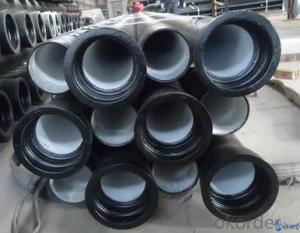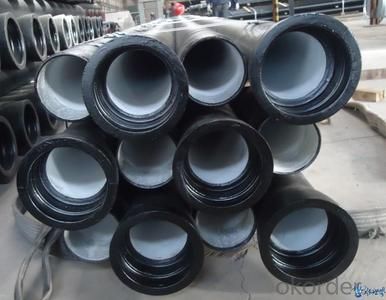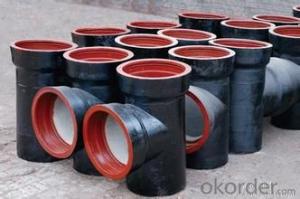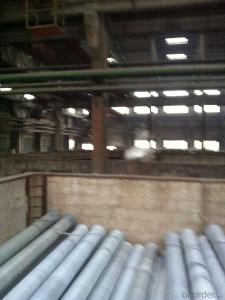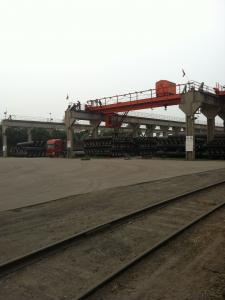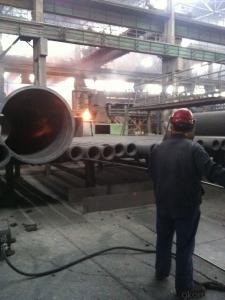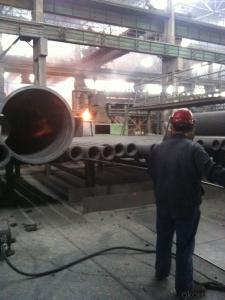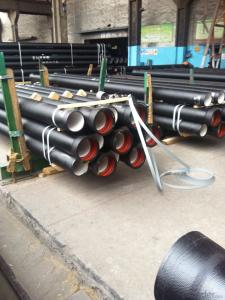DUCTILE IRON PIPES AND PIPE FITTINGS K9 CLASS DN100
- Loading Port:
- Tianjin
- Payment Terms:
- TT OR LC
- Min Order Qty:
- 22 pc
- Supply Capability:
- 3000 pc/month
OKorder Service Pledge
OKorder Financial Service
You Might Also Like
Material : Ductile Cast Iron
Size Range : DN 80mm to DN 2000mm
Unit Effective Length : 6m or 5.7m
Manufacture Standard: ISO 2531:1998/ EN 545:2006/EN 598:2007
Annual capacity : 200,000 tons
Coating Exterior: Zinc 130g/m2 according to ISO 8179-1 and bitumen coating 70 microns.
Cement Interior: Portland Cement/ High Alumina Cement/ Sulphate Resisting Cement Lining according to ISO 4179
Special requirements on external coating and internal lining can be applied
We also provide accessories such as SBR/EPDM rubber gaskets, lubricant paste, pipe caps, PE sleeves, etc.
Additional Parts:
Each pipe is strictly inspected according to related standard to ensure permanently high performance.
Easy Installation at site and service free for life
Long Service Lifespan
Quotation will arrive you within 24hours once we get your inquiry.
We guarantee offering you a competitive price.
A copy of original inspection reports of pipes will be offered after shipment.
Photos of loading process will be sent to the customer after shipment effect.
We will follow-up the delivery progress after shipment effect and update to the customer on weekly basis.
- Q: Can ductile iron pipes be used in potable water systems?
- Yes, ductile iron pipes can be used in potable water systems. Ductile iron is a type of cast iron that has enhanced strength and ductility. It is a common material choice for water infrastructure, including potable water systems, due to its durability, resistance to corrosion, and long service life. Ductile iron pipes are manufactured to meet specific standards and regulations for potable water usage, ensuring that they are safe for transporting drinking water. Additionally, ductile iron pipes have excellent flow characteristics, making them suitable for water distribution systems. Overall, ductile iron pipes are a reliable and commonly used material in potable water systems.
- Q: Are ductile iron pipes resistant to hydrostatic pressure?
- Ductile iron pipes exhibit resistance to hydrostatic pressure. These pipes are a variant of cast iron that is renowned for its robustness and longevity. Its mechanical attributes, including exceptional tensile strength and elasticity, empower it to endure significant levels of hydrostatic pressure. Consequently, ductile iron pipes are an optimal choice for tasks where pressurized water or other fluids must be conveyed, such as in water distribution systems, sewer lines, and industrial pipelines. Furthermore, these pipes possess a formidable resistance to corrosion, bolstering their capacity to withstand hydrostatic pressure and guaranteeing their enduring effectiveness and dependability.
- Q: Can ductile iron pipe be used for high-pressure gas systems?
- Yes, ductile iron pipe can be used for high-pressure gas systems. Ductile iron pipe is known for its high strength and durability, making it suitable for applications that require high-pressure systems. It possesses excellent mechanical properties, including high tensile strength, yield strength, and impact resistance, which allow it to withstand the pressures associated with gas transmission. Furthermore, ductile iron pipe is resistant to corrosion, making it a reliable choice for long-term use in high-pressure gas systems. However, it is important to consider the specific requirements and regulations of the gas system, as well as consult with industry professionals, to ensure that the ductile iron pipe is installed and maintained correctly for optimal safety and performance.
- Q: Are ductile iron pipes resistant to abrasion?
- Yes, ductile iron pipes are resistant to abrasion. Ductile iron is a type of cast iron that has been treated with magnesium to improve its strength and ductility. This makes it highly resistant to wear and tear, including abrasion. Ductile iron pipes are commonly used in applications where they may come into contact with abrasive materials such as sand, gravel, or other particles in the flow. The material's ability to withstand abrasion helps ensure its long-term durability and reliability in various industries, including water distribution, sewer systems, and industrial pipelines.
- Q: What are the different lining thickness options for ductile iron pipe?
- The different lining thickness options for ductile iron pipe typically depend on the specific application and the requirements of the project. The most common lining options for ductile iron pipe include cement mortar lining, polyurethane lining, and polyethylene lining. Cement mortar lining is one of the oldest and most widely used lining options for ductile iron pipes. It involves applying a layer of cement mortar to the inner surface of the pipe, which provides protection against corrosion and enhances the hydraulic performance of the pipe. The thickness of cement mortar lining can vary, typically ranging from 3mm to 6mm. Polyurethane lining is another popular choice for ductile iron pipes, especially in applications where resistance to abrasion and chemical attack is required. Polyurethane linings are typically applied using a spray or casting method, and the thickness can vary depending on the specific requirements of the project. Generally, polyurethane linings can range from 1mm to 4mm in thickness. Polyethylene lining is a relatively newer technology for ductile iron pipes and is commonly used in applications where resistance to chemical corrosion is necessary. Polyethylene linings are typically applied using a rotational lining process, where a layer of molten polyethylene is evenly distributed on the internal surface of the pipe. The thickness of polyethylene lining can vary from 2mm to 8mm, depending on the specific project requirements. It is important to note that the lining thickness can be customized based on the specific requirements of the project, such as the corrosiveness of the transported fluid, the operating conditions, and the desired service life of the pipe. Consulting with a qualified engineer or pipe manufacturer is recommended to determine the most suitable lining thickness for a particular application.
- Q: Nodular cast iron, heat treatment process and so on
- The chill is estimated to be too low in carbon equivalent, poorly bred or cooled too quickly!
- Q: Can the underground cast iron pipes be connected with clamps to form buttress?
- Best not to, because the use of clamp connection way to connect the poor integrity of the pipeline, the base treatment is not in place or uneven settlement, it is easy to produce deformation, resulting in pipe bending deformation, easily leaked from the junction.
- Q: DN1800 can the length of ductile iron pipes be several meters? What is the total weight?
- In quality, the spheroidization of cast iron pipes is controlled to be 1-3 (spheroidization rate 80%), so the mechanical properties of the cast iron pipes, ductile iron pipes and finished product libraries can be better improved, with the nature of iron and the properties of steel.
- Q: Ductile iron 600-3 grade, tensile strength, how to test, there is a simple way?
- 600-3 is pearlite + a small amount of ferrite matrix ductile iron. Pearlite edge region. 10%, center. 70600-3. Two sets of numbers indicating the grades and mechanical properties of nodular cast iron. The former represents the minimum tensile strength
- Q: Is the ambient temperature at minus 20 degrees better with grey cast iron or ductile iron?
- Ductile iron is good, its tensile properties are destined to withstand low temperatures, gray cast iron is a little bit worse.
Send your message to us
DUCTILE IRON PIPES AND PIPE FITTINGS K9 CLASS DN100
- Loading Port:
- Tianjin
- Payment Terms:
- TT OR LC
- Min Order Qty:
- 22 pc
- Supply Capability:
- 3000 pc/month
OKorder Service Pledge
OKorder Financial Service
Similar products
Hot products
Hot Searches
Related keywords
